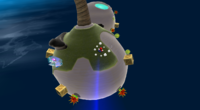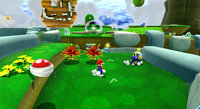Thorny flower
Thorny flowers[1], also described as spiky things[2], prickly plants[3], plants[4], prickly flowers[5], spikes[6], thistles[7], and internally described as Needle Plants[8][9], are red plants that serve as obstacles in several Mario games. They are first seen in Super Mario Galaxy.
History
Super Mario series
Super Mario Galaxy / Super Mario Galaxy 2


In Super Mario Galaxy and Super Mario Galaxy 2, prickly plants damage Mario or Luigi when touched, and the only way to destroy them is by attacking them with a rubbery bulb, spinning a coconut into them, having Yoshi eat them, or rolling into them in Rock form.
There are three types: the standard variant, a larger variant, and a floating variant. The larger variants, after being destroyed by a coconut, will reveal a Sling Star or Launch Star leading to another planet. The floating variants serve as obstacles in various areas, and are more common in certain galaxies, like the Gusty Garden Galaxy, the Yoshi Star Galaxy, and the Tall Trunk Galaxy.
When touched by the Co-Star Luma, prickly plants will retract their spikes, allowing Mario or Luigi to pass over them safely without needing to destroy them.
Super Mario 3D Land
Thistles later appear in Super Mario 3D Land, being first encountered in World 4-1. As of this game, their thorns are stubbier and are arranged in a globe, instead of being grown from the plant's calyx like in the previous games; their leaves also continuously rotate around their stems. They can be destroyed with projectiles (such as the Fire form's fireballs), a tail whip in Tanooki form, by landing onto them in Statue form, or by touching them while invincible.
Mario Party series
Mario Party: Island Tour
In Mario Party: Island Tour, thorny flowers make an appearance in the minigame Goomba to Maneuver, scattered on the path that the player needs to follow. The player needs to maneuver a line of Goombas between them. Goombas that touch a thorny flower will be flung away, reducing the number of Goombas in the line. Thorny flowers appear in both normal and big sizes, with bigger ones becoming more common as the minigame progresses.
Mario Party: Star Rush
In Mario Party: Star Rush, thorny flowers appear as obstacles in the minigame Leafboard Hoard.
Names in other languages
| Language | Name | Meaning | Notes |
|---|---|---|---|
| Japanese | トゲ草[10] Toge Kusa トゲ植物[11] Toge Shokubutsu |
Thorn Grass (Super Mario Galaxy and Super Mario Galaxy 2) Thorn Plant (Super Mario 3D Land) |
|
| German | Stachelgras[?] | Barbed grass | |
| Italian | Pianta Ago[12] | Needle Plant |
References
- ^ "Get as many Goombas to the finish line as possible without leading them into the thorny flowers." - Controls for Tour and Simple in Mario Party: Island Tour (British English version)
- ^ "Apparently those spiky things just HATE coconuts! Shake to spin and smack them with coconuts!" - Text from a Purple Toad in Super Mario Galaxy
- ^ Black, Fletcher. Super Mario Galaxy PRIMA Official Game Guide, pages 43, 48, 50, 53, 170, 171, 175, 177, 178, 202, 207, 244, 303.
- ^ Black, Fletcher. Super Mario Galaxy PRIMA Official Game Guide, pages 48, 50, 53, 170, 202
- ^ Black, Fletcher. Super Mario Galaxy PRIMA Official Game Guide, page 302.
- ^ Browne, Catherine. Super Mario Galaxy 2 PRIMA Official Game Guide, pages 112, 113, 114, 118.
- ^ von Esmarch, Nick. Super Mario 3D Land PRIMA Official Game Guide. Page 187.
- ^ Super Mario Galaxy / Super Mario Galaxy 2 internal filename (NeedlePlant)
- ^ Super Mario 3D Land internal filename (NeedlePlant)
- ^ Shogakukan. 2015. Super Mario Bros. Hyakka: Nintendo Kōshiki Guidebook, pages 136 and 170.
- ^ Shogakukan. 2015. Super Mario Bros. Hyakka: Nintendo Kōshiki Guidebook, Super Mario 3D Land section, page 185.
- ^ Super Mario Bros. Enciclopedia, pagg. 136 and 170

